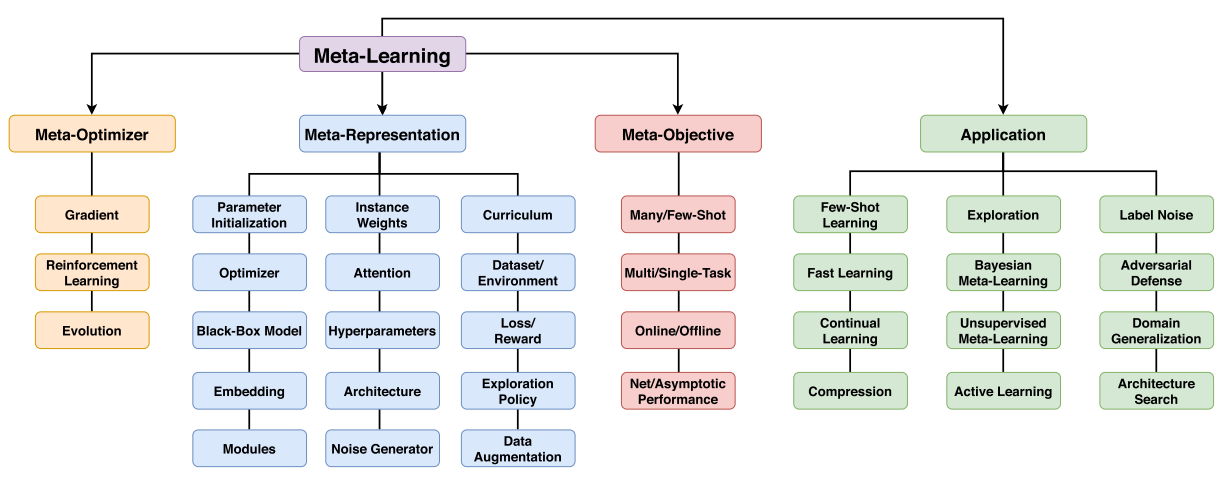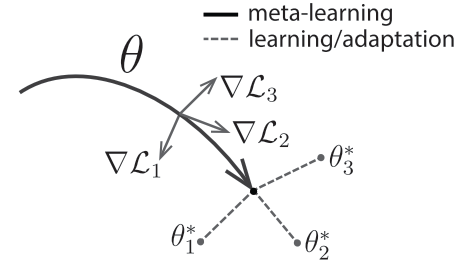A note taking for meta learning
Last updated on:3 years ago
Meta learning, or learning to learn, has seen a dramatic rise in interest in recent years. Someone says the development of artificial intelligence is: machine learning -> deep learning -> deep reinforce learning -> deep meta learning. So, I took some note for meta learning to see if it is that kind of essential.

Introduction
Wiki: Meta learning is a branch of metacognition concerned with learning about one’s own learning and learning processes.
R.Vilalta: Meta learning studies how learning systems can increase in efficiency through experience; the goal is to understand how learning itself can become flexible according to the domain or task under study.
Hospedales: Contrary to conventional approaches to AI where tasks are solved from scratch using a fixed learning algorithm, meta-learning aims to improve the learning algorithm itself, given the experience of multiple learning episodes. Meta learning provides an alternative paradigm where a machine learning model gains experience over multiple learning episodes - often covering a distribution of related tasks - and uses this experience to improve its future learning performance.
Meta learning in neural networks can be seen as aiming to provide the next step of integrating joint feature, model, and algorithm learning.
Advantages
- Data and computation efficiency
- Better aligned with human and animal learning
Disadvantages
It can be seen in the future work.
Formalizing meta learning
Task distribution view
Finn et al. tried to find model parameters that are sensitive to changes in the task, such that small changes in the parameters will produce large improvements on loss function of any task drawn from $p( \mathcal{T})$. Their meta learning method optimizes for a representation $\theta$ that can quickly adapt to new tasks.

Meta optimizer, meta representation, and meta objective
To be continued …
Recent Advances
With superior advances, meta learning is used in computer vision, reinforcement learning, architecture search and so on.
- Few-shot learning, Fast learning, continual learning, compression.
- Exploration, Bayesian meta learning, unsupervised meta learning, active learning
- Label noise, adversarial defence, domain generalization, architecture search
Computer vision and graphics
- Few-shot learning methods: classification, object detection, landmark prediction, few-shot object segmentation, image and video generation, generative models and density estimation
- Few-shot learning benchmarks: dataset diversity, bias and generalization
Meta reinforcement learning and robotics
- Methods: exploration, optimization, online meta-RL, on - vs off- policy meta-RL
- Benchmarks: discrete control RL, continuous control RL
Unsupervised meta learning
- Unsupervised learning of a supervised learner
- Supervised learning of an unsupervised learner
Continual, online and adaptive learning
- Continual learning
- Online and adaptive learning
- Benchmarks
Domain adaptation and domain generalization
- Domain generalization
- Domain adaptation
- Benchmarks
Language and speech
- Language modelling
- Speech recognition
Systems
- Network compression
- Communications
- Active learning
- Learning with label noise
- Adversarial attacks
- Recommendation systems
Others
- Environment learning and Sim2Real
- Neural architecture search (NAS)
- Bayesian meta learning
- Hyper-parameter optimization
- Novel and biologically plausible learners
- Meta learning for social good
- Abstract reasoning
Future Work
- Diverse and multi-modal tasks distributions.
- Meta-generalization.
- Task families.
- Computation cost & many - shot
Code Demonstration
Meta learning is learn to learn. So, there must be something that already be trained. Meta training learn from meta validating. Meta support (validation) for query learning (train). (Query) Ask question: how to learn, and learn from the network just learn from query
Dataset params
n_way, the number of classes for each support and query batch
# 1.select n_way classes randomly
selected_cls = np.random.choice(self.cls_num, self.n_way, False) # no duplicatek_spt, the amount of support data for each class
k_qry, the amount of query data for each class
Network params
Task_num, meta batch size. Each meta tranining epoch includes Task_num training epochs
Meta_lr, meta-level outer learning rate, learning rate for meta optimizer
Update_lr, task-level inner update learning rate, learning rate for training
# 3. theta_pi = theta_pi - train_lr * grad
fast_weights = list(map(lambda p: p[1] - self.update_lr * p[0], zip(grad, fast_weights)))
self.meta_optim = optim.Adam(self.net.parameters(), lr=self.meta_lr)Update_step, task-level inner update steps.
Update_step_test, update steps for finetuning.
Each task has Update_step NO. to update learning rate in task-level.
Learner
This function can be called by finetuning, however, in finetuning, we don’t wish to update running_mean/running_var. Though weights/bias of bn is updated, it has been separated by fast_weights. Indeed, to not update running_mean/running_var, we need set update_bn_statistics=False. But weight/bias will be updated and not dirty initial theta parameters via fast_weiths.
self.net = Learner(config, args.imgc, args.imgsz)maml = Meta(args, config).to(device)
db = DataLoader(mini, args.task_num, shuffle=True, num_workers=2, pin_memory=False)
for step, (x_spt, y_spt, x_qry, y_qry) in enumerate(db):
x_spt, y_spt, x_qry, y_qry = x_spt.to(device), y_spt.to(device), x_qry.to(device), y_qry.to(device)
accs = maml(x_spt, y_spt, x_qry, y_qry)
if step % 30 == 0:
print('step:', step, '\ttraining acc:', accs)
if step % 500 == 0: # evaluation
db_test = DataLoader(mini_test, 1, shuffle=True, num_workers=1, pin_memory=True)
accs_all_test = []
for x_spt, y_spt, x_qry, y_qry in db_test:
x_spt, y_spt, x_qry, y_qry = x_spt.squeeze(0).to(device), y_spt.squeeze(0).to(device), x_qry.squeeze(0).to(device), y_qry.squeeze(0).to(device)
accs = maml.finetunning(x_spt, y_spt, x_qry, y_qry)
accs_all_test.append(accs)
# [b, update_step+1]
accs = np.array(accs_all_test).mean(axis=0).astype(np.float16)
print('Test acc:', accs)Training
# 1. run the i-th task and compute loss for k=0
logits = self.net(x_spt[i], vars=None, bn_training=True)
loss = F.cross_entropy(logits, y_spt[i])
grad = torch.autograd.grad(loss, self.net.parameters())
fast_weights = list(map(lambda p: p[1] - self.update_lr * p[0], zip(grad, self.net.parameters())))
# this is the loss and accuracy before first update
with torch.no_grad():
# [setsz, nway]
logits_q = self.net(x_qry[i], self.net.parameters(), bn_training=True)
loss_q = F.cross_entropy(logits_q, y_qry[i])
losses_q[0] += loss_q
pred_q = F.softmax(logits_q, dim=1).argmax(dim=1)
correct = torch.eq(pred_q, y_qry[i]).sum().item()
corrects[0] = corrects[0] + correct
# this is the loss and accuracy after the first update
with torch.no_grad():
# [setsz, nway]
logits_q = self.net(x_qry[i], fast_weights, bn_training=True)
loss_q = F.cross_entropy(logits_q, y_qry[i])
losses_q[1] += loss_q
# [setsz]
pred_q = F.softmax(logits_q, dim=1).argmax(dim=1)
correct = torch.eq(pred_q, y_qry[i]).sum().item()
corrects[1] = corrects[1] + correct
for k in range(1, self.update_step):
# 1. run the i-th task and compute loss for k=1~K-1
logits = self.net(x_spt[i], fast_weights, bn_training=True)
loss = F.cross_entropy(logits, y_spt[i])
# 2. compute grad on theta_pi
grad = torch.autograd.grad(loss, fast_weights)
# 3. theta_pi = theta_pi - train_lr * grad
fast_weights = list(map(lambda p: p[1] - self.update_lr * p[0], zip(grad, fast_weights)))
logits_q = self.net(x_qry[i], fast_weights, bn_training=True)
# loss_q will be overwritten and just keep the loss_q on last update step.
loss_q = F.cross_entropy(logits_q, y_qry[i])
losses_q[k + 1] += loss_q
with torch.no_grad():
pred_q = F.softmax(logits_q, dim=1).argmax(dim=1)
correct = torch.eq(pred_q, y_qry[i]).sum().item() # convert to numpy
corrects[k + 1] = corrects[k + 1] + correct# end of all tasks
# sum over all losses on query set across all tasks
loss_q = losses_q[-1] / task_num
# optimize theta parameters
self.meta_optim.zero_grad()
loss_q.backward()
# print('meta update')
# for p in self.net.parameters()[:5]:
# print(torch.norm(p).item())
self.meta_optim.step()
accs = np.array(corrects) / (querysz * task_num)
return accsReference
[1] Wiki, Meta learning
[2] Vilalta, R. and Drissi, Y., 2002. A perspective view and survey of meta-learning. Artificial intelligence review, 18(2), pp.77-95.
[3] Finn, C., Abbeel, P. and Levine, S., 2017, July. Model-agnostic meta-learning for fast adaptation of deep networks. In International conference on machine learning (pp. 1126-1135). PMLR.
[4] Hospedales, T., Antoniou, A., Micaelli, P. and Storkey, A., 2020. Meta-learning in neural networks: A survey. arXiv preprint arXiv:2004.05439.
[5] Pavel Brazdil, Meta-Learning
本博客所有文章除特别声明外,均采用 CC BY-SA 4.0 协议 ,转载请注明出处!